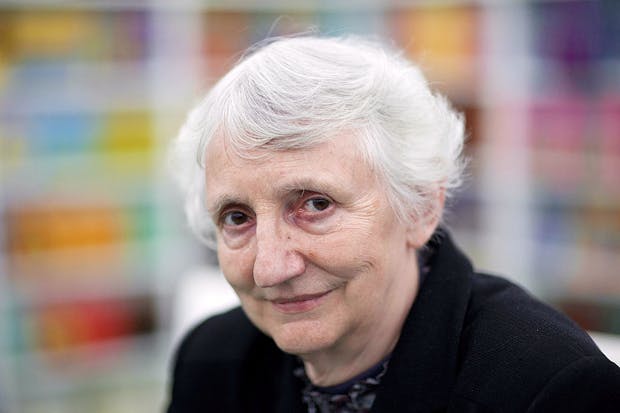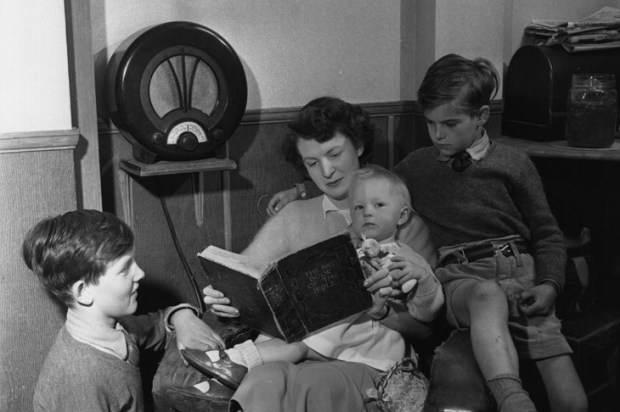In After the Vote, her talk for this week’s special edition of A Point of View (Radio 4) on the subject of Brexit, the philosopher (and former Reith lecturer) Onora O’Neill suggested that the media have played a large part in creating our current crisis. All branches of it failed ‘to communicate with the public an accurate and honest account’, she argued. The BBC, she said, ‘provided coverage but failed to challenge unfair or dubious claims’ by either side, adding that ‘democracy does not work if such claims are not properly challenged’. This for her is the true nature of ‘the democratic deficit’ — lack of information, of informed debate, of proper checks. The public, she argued, were not given ‘credible, accessible and assessable information’ on the big questions we faced before the vote and are now being confronted with afterwards.
O’Neill’s talk was just one of five this week, in an attempt to provide each morning a more balanced perspective on what Brexit means. It came as a relief after such days of bitterness, bile and misinformation to hear O’Neill’s measured thoughtfulness.
Elsewhere on Radio 4 there were other reassuring signs that the country has not yet quite gone to the dogs. The roses are still blooming in John Betjeman’s Metroland, those districts of outer London served by the Metropolitan Line and including Chesham, Pinner and Northwood, reported Hugh Muir in Black Flight and the New Suburbia (Sunday). Much else, though, is changing. In Pinner, for instance, the cricket XI is now mainly made up of black or Asian players, part of the exodus of people of ethnic origin to the suburbs. The high street has shops selling spices, yams and plantains. There are mosques and temples in the vicinity.
Muir wanted to find out why so many black people were leaving the inner city behind, and the community they had grown up in, and what problems they had faced on moving into the suburbs. It’s a surprisingly upbeat story, and not at all what you might expect to hear. Most of these migrants from the city moved out, like their white counterparts, because of gentrification pushing up house prices in places like Hackney, Leyton, Brixton and Mile End. It was the only way to buy a house. But the move outwards was not such a big change. ‘We are second generation. Those connections to our cultural background were already diluted.’
In Chalfont St Giles, in deepest Buckinghamshire, he met a family whose son now plays in the village football team. The father said he never really felt it to be ‘a challenge’ settling into commuter-belt life. He had come across some awkward conversations but saw this as an opportunity, not an issue. There have been tensions elsewhere. In the suburbs of Leeds, Muir was told that British-born residents with a typical love of gardening have been irritated by the incoming Asian families whose view is rather different, often paving over the front garden to park their cars. But overall the picture he drew was of a new diversity that is enriching these communities rather than causing divisions. The church spires of Metroland might now find themselves in competition with domes and minarets, but Muir argued that Betjeman’s beloved suburbs could be an example to the rest of the country on how to manage these new ‘internal’ migrations.
In The Untold this week, Grace Dent’s series delving into the personal stories behind the privet hedge, we heard from Phillida and Christopher Purvis, who are trying to raise the money to create their own Marigold Hotel. If you’ve not seen the film (starring Judi Dench and Maggie Smith and telling a fictional story about a group of pensioners who go to India to live out their retirement in a rundown hotel), the Purvises’ plan is to open a guest-house in the Nilgiri Hills, on the borders of Tamil Nadu and Kerala, which will provide a rest home for their ageing and worn-out western friends. In exchange their guests will offer their professional skills to the local Adivasi people, much of whose land was taken from them years ago to create the tea plantations of the Raj.
The Purvises need to persuade their friends to cough up an initial £10,000 each in exchange for a month’s stay in India each year for ten years. This will give them the £100,000 they need to build the ‘hotel’ and set up the training schemes and community projects that are all part of their big plan. You could say it’s a new kind of benevolent colonialism. ‘If enough people believe in it, it will be sustainable,’ the couple said. But they’ve yet to raise the money. And, as they are discovering, it’s not so easy to work out how to help the Adivasi. When it was suggested to the local people that to make more money from the honey they collected in the forest they should sell the beeswax as well, they refused, explaining that they leave the beeswax behind for the bears because it stops them attacking us. You can’t argue with that.
Got something to add? Join the discussion and comment below.
Get 10 issues for just $10
Subscribe to The Spectator Australia today for the next 10 magazine issues, plus full online access, for just $10.














Comments
Don't miss out
Join the conversation with other Spectator Australia readers. Subscribe to leave a comment.
SUBSCRIBEAlready a subscriber? Log in